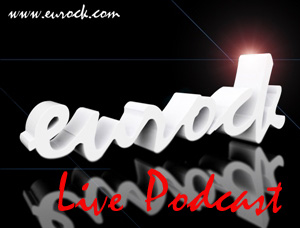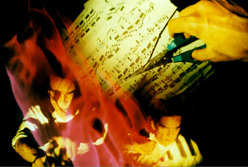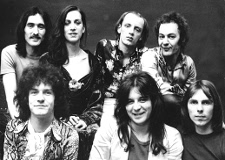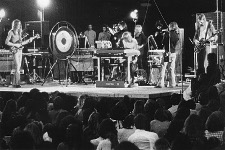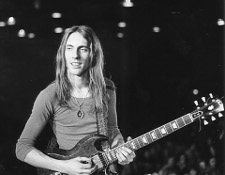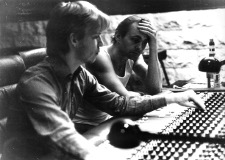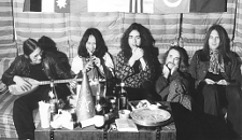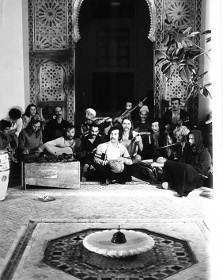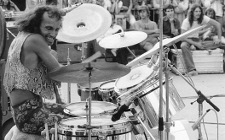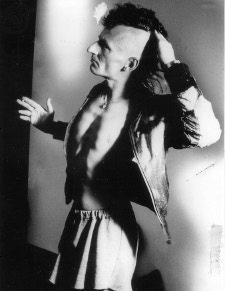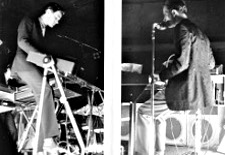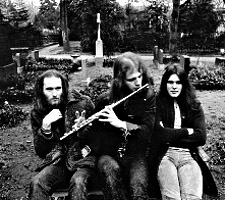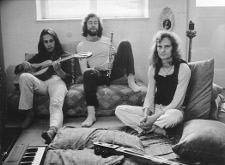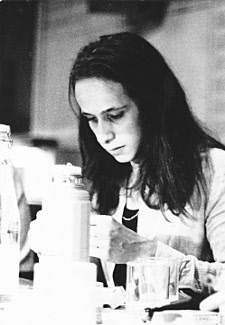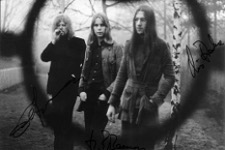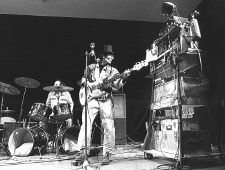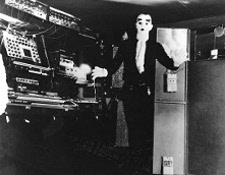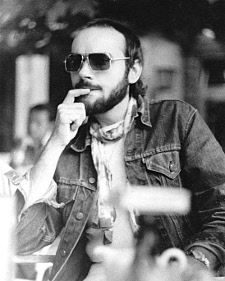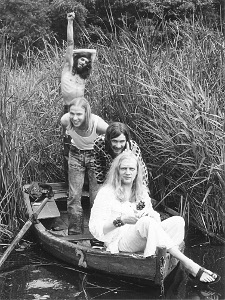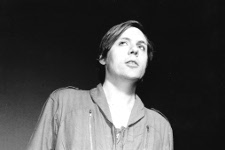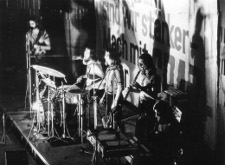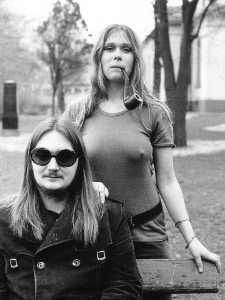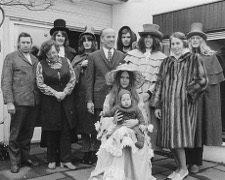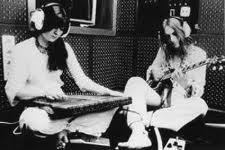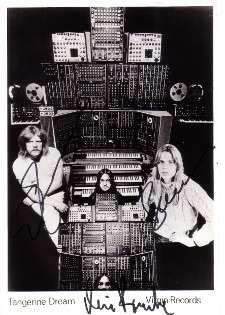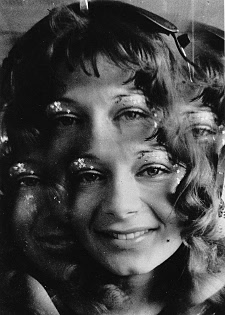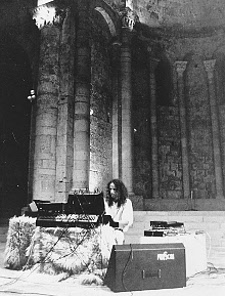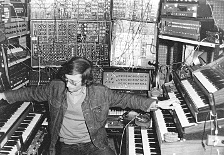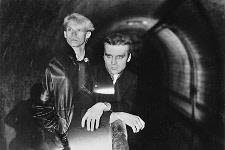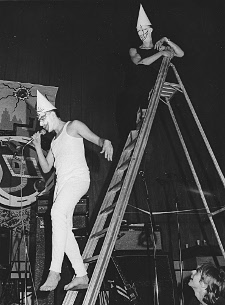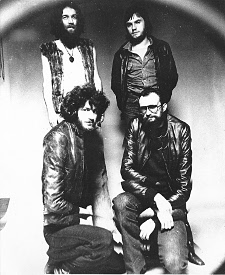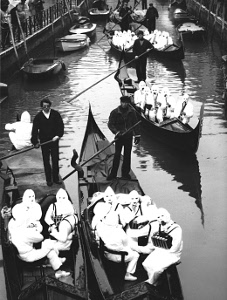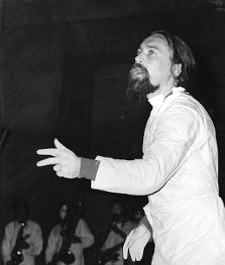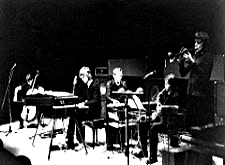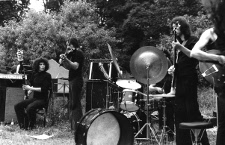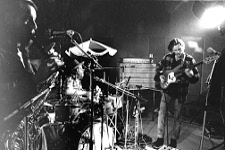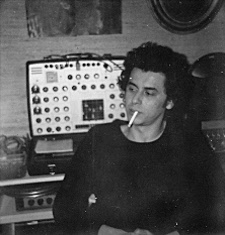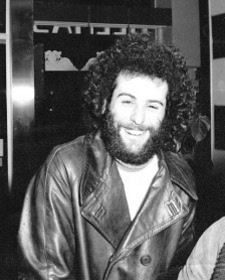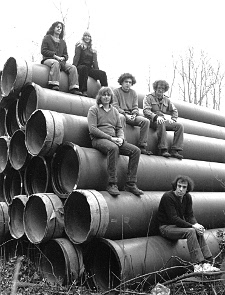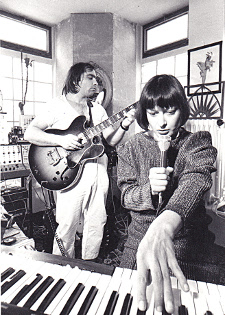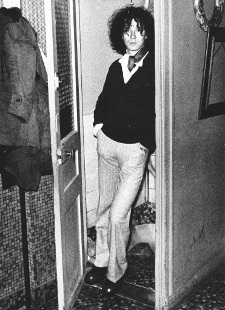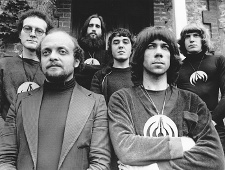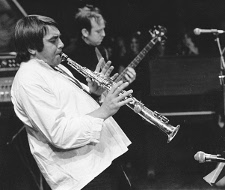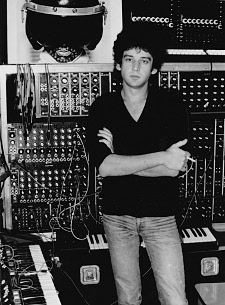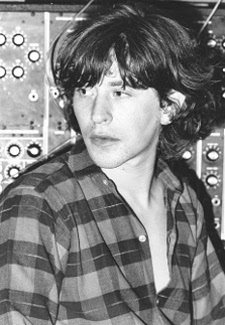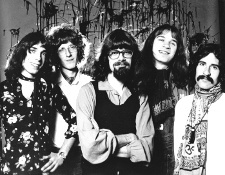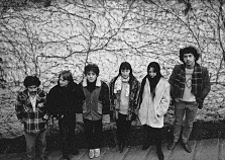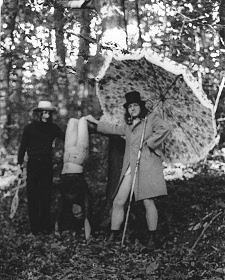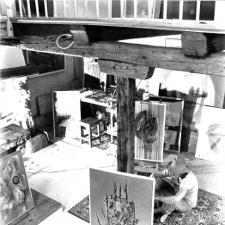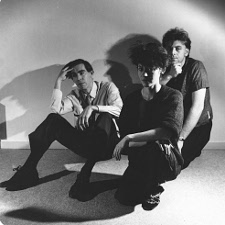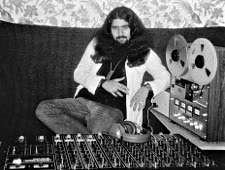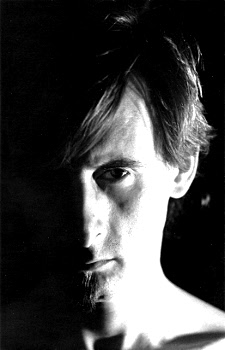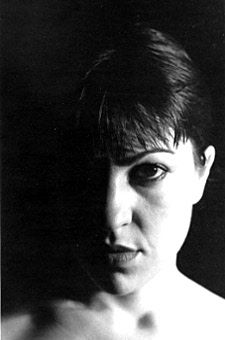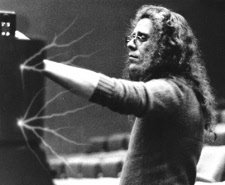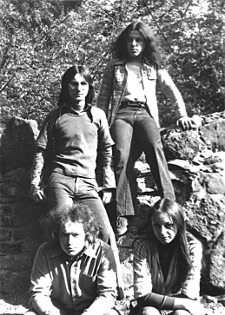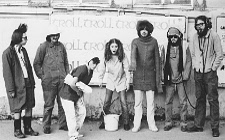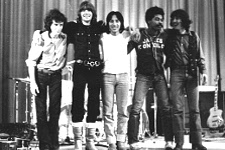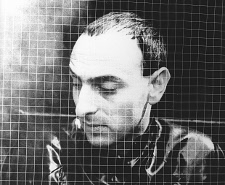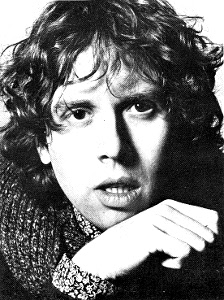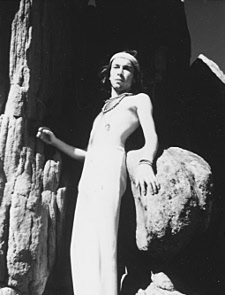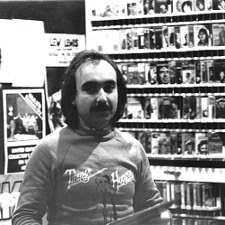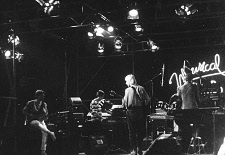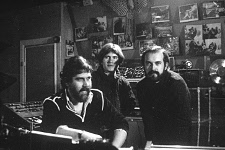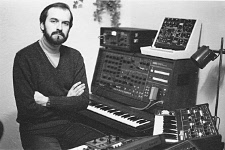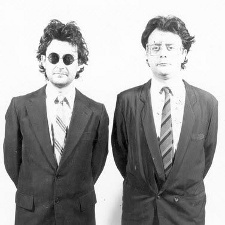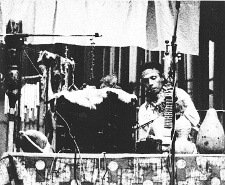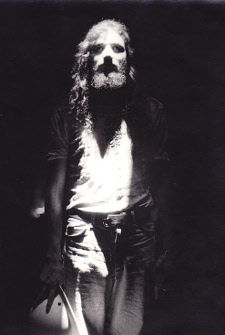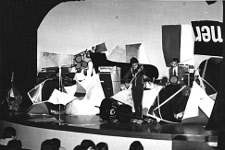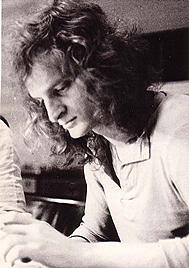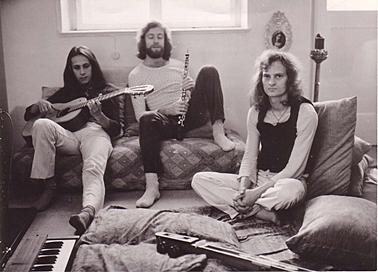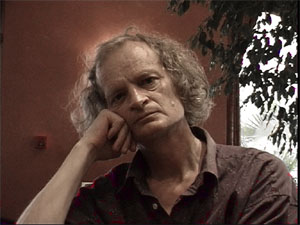The Story so far...
1970's- FM radio, Alternative Magazine & 1st US Indie Distributor of Euro Rock
1980's- D.I.Y. LP + Cassette & CD label
1990's- Distribution via the WWW
2010- Eurock.com ~ Multimedia Podcasting, Interviews & Reviews.
Label & Artist Submissions Accepted for Review...
Klassik Krautrock
Artistes Français
|
|
Florian Fricke Interview
As the year 2001 came to a close Florian Fricke passed away. Thanks to Gerhard Augustin in Germany, Florian's good friend and mine, I was one of the first in the USA to hear Popol Vuh's music way back in 1970 when he sent me a copy of AFFENSTÜNDE. There's a story I like to tell about Popol Vuh from the days of Eurock's initial incarnation as a FM radio program in Central California. In late 1972 I aired a long 1 hour set of Popol Vuh music that featured one side each of AFFENSTÜNDE, IN DEN GÄRTEN PHAROAS, ending with HOSIANNA MANTRA. Near the conclusion there came a phone call from a woman who wanted to pass along a heartfelt thanks to the station for playing that music. She said her young daughter was teething and had been fussing all day, unable to nap, and in general miserable. As the show progressed and HOSIANNA MANTRA came on she said the baby calmed and drifted off by shows end. She was eternally grateful and asked that we please play it again in future. That story illustrates the true power of great music, and Florian's magical musical talent in particular. When I passed along the news of his death, I got many people telling me of the special place some of his particular albums had played in their lives as well. They all had once again dug them out and were engaging in their own little personal memorials to the beauty and joy his music had brought them. This Interview done by Gerhard is incredibly rare. I had tried a couple times myself to arrange something, but have never seen any interviews with Florian. In fact, at times Popol Vuh was referred to as a "phantom band out of Munich" by people in the music business in Germany for Florian was a very private person. Therefore I consider it a wonderful gift to present here the first known English interview with him. Read it, listen to your favorite album of his, and remember him fondly. All these many years later I wouldn't think that long ago woman in California knows about his passing. But I and many others will continue to play his music , remembering him through his works until the end of our days. His music will continue to eternally be an invocation of the Spirit of Peace for all who listen... Archie Patterson
GA: You have done a lot of music for the films of Werner Herzog; do you know him personally very well? FF:
Yes, I am a good friend with Werner Herzog for many, many years.
We don't see each other too often anymore because he is very busy with his films and I am very
busy with my music.
And that is the reason why we see each other, or meet each other, only for our mutual work. There
are some things that I do admire about Werner Herzog.
The thing I admire most is his consequence in following through the things that he is planning
to do, and he is actually doing them. Werner Herzog is one of my few friends that are very famous and have, regardless of
their fame, not changed at all. Their personality has remained stable and he is in no way different from the way I
knew him 25 years ago. He still drinks his beer from the bottle. GA: By reading the old Mayan book "Popol Vuh" you must have gotten the idea of the band's name. What kind of inspiration, what kind of feelings did you have when you were reading the book? FF:
When I read the book for the first time, I got ideas all of a sudden by which I
was able to define other old books. I found a key in the book of "Popol
Vuh." I was able to
understand the way people in the very early days described the creation of
Earth. And the way of human evolution.
I was touched like by a thunderstorm.
In those days, in the late '60s, when musical groups were looking for names, they were usually
looking for a name that was expressing their music within the name. Otherwise
it doesn't have any particular meaning. GA: But also, do you think that your feeling, or the inspiration that you got from the book "Popol Vuh" was also based on the counterculture movement on the '60s? FF:
In a certain way, yes. In those
days the society was not only a political society, in Europe we had the '68
revolution which started in Paris, but also was part of the German change in
culture and society, and music was a great part in this change.
But there was also a spiritual revolution.
We have discovered the Eastern part of this globe, of this world, over and over again. The
culture of the old Maya, of the book "Popol Vuh," was one way for us
to find ourselves, re-define our ideas in early days.
So we were actually looking for these kinds of inspirations, where we could refer to holy
books, whether it was The Bible or the "Popol Vuh" (the book of the
Maya culture), or the Bhagavad-Gita, like this. Different sources of information were coming to us. GA: Now, tell us about your gigantic Moog Synthesizer III, the system of the late ‘60s, which was only used by very few musicians. What sort of ideas did you try to express with the electronics of the Moog synthesizer? FF:
It was a great fascination to encounter sounds that were until those days not
heard before from the outside. It
was the possibility to express sounds that a composer was hearing from within
himself, which in many cases are different from what a normal instrument could
express. Therefore, this was a
fantastic way into my inside consciousness, to express what I was hearing
within myself. GA: Why did you stop playing the synthesizer in '72? FF:
I always had this great desire to find an instrument that could express a human
voice, of vocals or the singing of a girl for instance, by electronic means. When
you listen to IN DEN GÄRTEN PHAROAS on the A-side you will find this
voice.
And all of a sudden this voice that I felt was in myself, really came into my life when Djong
Yun appeared. I wanted to do
something really new, in those days, and the synthesizer was part of what I
wanted to do. You should know that
over the last 25 years I have always tried to create new music and new styles
of music. I think otherwise it
would be too boring. GA: Did the title AFFENSTÜNDE have a double meaning for you? Like a first step for the band's genesis of the book "Popol Vuh"? FF:
Yes, it had a double meaning. Each
title has to be open for associations. That
is a creative offer. What I,
myself, really understand from AFFENSTÜNDE, is that it is the moment
when the human being becomes a human being, where man becomes man.
When a human being becomes a human being and is no longer an ape any longer. So
that is my double meaning for AFFENSTÜNDE, that is the moment where the
human being of a monkey turns into the human being of a human kind. GA: I have thought that AFFENSTÜNDE could have been a kind of 'trip-music' for you, and you were inspired by your own drug experience. Is this right, or how do you feel about that? FF:
We were all, in one way or another, involved in some sort of excitement, which
you may call drugs, whether it was taking LSD, or smoking hashish, grass or
marijuana - minor experiences. But
you know that the way electronic instruments could be used in those days
offered such fantastic opportunities to express oneself.
There's no doubt about it that my music has delighted a lot of people who were into drugs or
smoking or taking trips or whatever, that was part of our musical culture in
those days. And my music was
especially geared towards this clientele.
I did not make music for classical music lovers, but for people that were into contemporary,
new music. But I did not make the
music because of that. GA: There are two songs in IN DEN GÄRTEN PHAROAS. Please tell me what idea did you have before making these tunes, and were these tunes improvised in the studio? FF:
One is a song that was recorded live in a church, "Vuh."
And the A-side, "In Den Gärten Pharaos," Frank Fiedler and I, who had already worked
on the AFFENSTÜNDE album, created this song actually in our home studio
and later went into another studio to do the mastering for it. The
last part of the song was recorded in the studio actually, like most of our
music has been recorded in studios, this was the Fender piano in the end. GA: It is said that HOSIANNA MANTRA is a musical Mass. FF:
Yes, in a way it was a Mass, a church Mass.
But not for church! A conscious reflection upon
religious origin is included in this music, but not in particular to any
religious groups.
GA: In HOSIANNA MANTRA there are some new personnel, such as Conny Veit and Djong Yun. How did you meet them, and how did you come to play with them? Let's first talk about Conny Veit. How did you meet him? FF:
Actually, most of the musicians have always sort of found their way to me to
play with me. I met Conny Veit at
United Artists, my record label at the time, in the office of somebody I knew
there (actually GA himself). GA: But this is how Conny started playing with you, he came to your house and you guys just sat down and played? FF:
Yes, and he has did this every day. And
that is how we actually prepared for almost half a year to records the album HOSIANNA
MANTRA. GA: And then Djong Yun, how did she come into the picture? FF:
Djong Yun came to Munich; she is the daughter of a famous composer.
She got the melodies, she was listening to what we were playing and she heard the melodies and
started singing with us. Yeah, we called it rehearsal! [laughs] GA: Did you, Conny Veit and Djong Yun ever perform as a band, publicly? FF:
Yes we did, actually, in Lieberkosen and Munich. GA: Tell us, what was the theme and how did you get the ideas of recording HOSIANNA MANTRA? And then can you tell us something about the artwork? FF:
In creativity there are not always reasons.
Some of the things are just flying straight through the window.
But at that time I was especially interesting in using first the words, and then making music
to the words, in other words there were existing lyrics that I wanted to add
music to. I wanted to convey the
depth of meaning contained in a word, and then transform this into musical
sounds, a from of musical expression. That is one way of composing music for me.
I don't always do it, but on and off I keep having an interest in composing in such way. GA: The name HOSIANNA MANTRA, where does it come from? FF:
HOSIANNA MANTRA is actually a combination of two different cultures, two
different languages, two different lives.
It has a dual meaning, "Hosianna" which is a religious Christian word, and
"Mantra" from the Indian religion of Hinduism.
Behind all of that I was convinced that basically all religions are the same. You
always find it in your own heart. And
the music of HOSIANNA MANTRA is really touching your heart.
It is made to touch your heart. That is why you
can call it a Mass. A Mass for
your own heart. GA: Can you remember any episodes in making the album HOSIANNA MANTRA? FF: I do remember when you ask me
about episodes. One of the
episodes was that Djong Yun was combing her hair more than she was taking time
to rehearse our music. It was much
more important to her personally to be pretty and beautiful for all of us. To
look the way she felt comfortable in order to sing comfortably.
We had absolutely nothing against that because she had very beautiful hair. Her
hair is as beautiful as her voice. She
was really a very nice, comfortable part of the group. Her behavior and
everything was very soothing. But
in general this production was no different from all the other productions.
We’d go prepared into the studio having a certain amount of ideas and music available, and
then improvise in addition to what we had already constructed. I've always looked for the fact that whenever we make music, or we were
producing music, that whoever is part of the group playing, is responsible for
their own playing within that formation.
Groupies were not allowed. [laughs] GA: How did you really get to meet Djong Yun, the very first time? Have you heard about her from other friends? FF:
In those days I was living in Munich in Halachein.
Musicians from other towns and cities that came to town came to Munich, by recommendation or
desire or whatever, came by my house, and we were just jamming. One
day Djong Yun came there. I was
playing with Andy Fix, the guitar player, and he was talking about this
incredible girl from Berlin, this singer from Berlin, and he said that I had to
meet he. That she was fantastic.
I was working with Esther Ofarim in those days, but it didn't work out because she refused to
sing Christian lyrics, being Jewish I guess, so she didn't want to interpret
this kind of song.
Which I did understand. In those days there was
not this competitive feeling among musicians, and the contacts were loose and
open. People were just visiting
each other for the sake of music, and not to discuss their recording contracts. In
a certain way we were all hippies in those days. GA: I feel that this album HOSIANNA MANTRA is one of the greatest albums that German rock has produced in the '70s. What, in your opinion, does this album mean to you, and what position does this album take in the career of Popol Vuh for you? FF:
When HOSIANNA MANTRA was released we had a great feedback from the press
and the public. There were these
voices that said HOSIANNA MANTRA was certainly the most beautiful record
that had been made until that day.
Personally, I still consider this music as incredibly beautiful.
But very rarely do I listen to music that I have made in the past.
I'm always living with the music that I'm now realizing, or producing, or making, whatever. So I don't really dwell in the past, and I don't think too much of the past, I think
more about tomorrow, the future, and what's happening right now. GA: Why did Djong Yun not join SELIGPREISUNG? FF:
She was in America, and only returned for the record following SELIGPREISUNG,
EINSJAEGER & SIEBENJAEGER. So
actually it was because she was in America in the days when we made SELIGPREISUNG.
I do regret that today, because I think I haven't really done a good service with my own voice
to my record. So it would have
been nice if Djong Yun had been there. GA: Can you tell us the concept, or the theme, the basic ideas of the albums EINSJAEGER & SIEBENJAEGER, DAS HOHELIED SALOMOS and LETZTE TAGE, LETZTE NACHT? FF:
EINSJAEGER & SIEBENJAEGER is finishing, or closing of the cycle.
DAS HOHELIED SALOMOS is the beginning of a new cycle.
In addition to the guitar player Conny Veit, I invited Danny Fichelscher, the drummer and
guitar player with Amon Düül, to play with me.
And that was the beginning of an extremely fruitful collaboration.
We have practically made music since then without interruption, we have been playing together
since then. For example, the
A-side of EINSJAEGER & SIEBENJAEGER was really played and recorded
in the first try, in one piece in the studio, and that was it.
We didn't change anything at all.
Actually I was giving in so much on this album to the style of Danny Fichelscher, the music of
Danny Fichelscher, that we have sort of stuck to this formula for the following
seven years. GA: I have a feeling that EINSJAEGER & SIEBENJAEGER and DAS HOHELIED SALOMOS were recorded in the same studio, and at the same time. FF:
No, they were not recorded at the same time.
Quite to the contrary. I think we made DAS
HOHELIED SALOMOS one year later, after EINSJAEGER & SIEBENJAEGER. In
between there were studio dates and recording dates and tours.
There were a lot of things happening.
So it was not really at the same time. GA: You often change a melody that you used before, and you use it again in a different tune. But the melodies in EINSJAEGER… seem to appear for the very first time there. FF:
This is what you could say about Mozart as well, because this is the individual
style of an artist, that you identify the artist with a certain melody, sound,
feeling or whatever it is.
You are right insofar as that we have been using these melodies as sort of a trademark in the
different works that we created.
And we have been playing this in various ways, different ways.
And sometimes we even like these new, different versions.
Compared to the other albums, SELIGPREISUNG and HOSIANNA MANTRA, we felt that
this music, with Danny and Djong in EINSJAEGER… was a more contemporary,
modern sound and music. But whatever we were doing in those days was really hermeneutic music. It's
one way of jubilation; it's our expression of jubilation. GA: Please tell us, is DAS HOHELIED SALOMOS your homage to the Old Testament, or is it dedicated to Djong Yun? FF:
DAS HOHELIED SALOMOS was taken from the Bible, yes.
It's a mystic love song. The whole album was
dedicated to love, that's all. GA: Around the period of IN DEN GÄRTEN PHAROAS, did you write the type of tune of AGUIRRE, and the album, why was it released in 1976, but the film was made in 1972? FF:
Don't ask me about those confusing facts about my musical record career. I'm not a part of that.
The music industry has created these unfortunate circumstances.
And if I would start talking about this in detail, I would have to mention names and persons
and people, so I'm trying to avoid that.
Insofar that some of these are not even living in our country anymore. GA: Tell me something; are you actually playing on the album YOGA? FF:
This is part of the same chapter. YOGA is an unauthorized release. Some Indian musicians visited me in my studio, and somebody else took the tapes and
sold them under the name of Popol Vuh, but it had nothing to do with Popol Vuh,
really. I'm playing harmonium, and
organ. I think it was released in
Italy. GA: I saw the film "Herz aus Glas" (“Coeur de Verre”) and I found that not very much of your music was used. In the album with the same name of the film, COEUR DE VERRE, is Popol Vuh's original album to be the soundtrack for the movie? FF:
It was different. Sometimes
they're produced for Werner Herzog's work. Sometimes he came to my house and he
asked please open your box, where I have my tapes from my productions.
When we are listening to music, sometimes he lifts his finger and says this part of your music
would be great music for a film.
Sometimes we have done in a very short day and night, time in studio at the end of production
from his movies, chosen the music like this.
The special music for COEUR DE VERRE ("Herz aus Glas") is Popol Vuh, but
sometimes he needs music from Richard Wagner.
But Richard Wagner never made film music for Werner Herzog. GA: Now we come to a question about the French Egg release of NOSFERATU. This is a compilation of already-released materials, and unreleased old materials, with new songs. Did you choose the tracks? FF:
It actually was Part Two of the original soundtrack.
The actual film music, the way it was composed for this movie, is on the record BRUDER DES
SCHATTENS, SOHNE DES LICHTS.
And when Werner was already almost finished with his film, he came to me and asked, “Florian,
do you have music to be afraid by?”
And I thought no, no, no, no. But I remembered
some electronic pieces in my big, big, big, box of old material from the early
years, and in this box I found 'angst music.'
And so we made a second record, besides BRUDER DES SCHATTENS… we made 'music to be
afraid by,' NOSFERATU, part two, released by a French company. GA: Would you please tell us something about Maya Rose and Guido Hieronymus, who have played on recent Popol Vuh albums? What kind of background do they have, and what were they doing before they joined Popol Vuh? First Maya Rose, the singer. FF:
Maya lived in Yucatan in Mexico, and at different occasions she sent me some
tapes where she was singing freely. I
had listened to them and I had put it to the side, because in those days I was
working with Renate, the Amon Düül singer, on the record FOR YOU AND ME.
After many years I listened to these recordings again and I found the voice for an idea that I
was working on which became the album CITY RAGA.
To be precise, my son Johannes, he actually gave me this tip to do this kind of record. He
said that this voice would please everybody. GA: So this is how you met Maya, on tape. Did you ever see her personally? FF:
Yes, many years before in Köln. She was a member of the Breathing Therapy
Society group, but moved to Yucatan and stayed in touch with me by sending
these strange, wonderful cassettes, with her voice on there.
When my son was hearing this voice he felt that it was really special. GA: Guido Hieronymus, who has played on all the recent Popol Vuh Albums, what kind of background does he have? FF:
Guido is a bit younger than Frank and I are.
He has studied music at the Conservatory in Munich.
He is producing and playing with many different musicians in Munich, in the music scene. And
when we started to work together, it was not clear from the beginning that
Guido would eventually become a member of Popol Vuh.
But by working with him over the last couple of years we have come to a point that Guido is
very important to Popol Vuh.
We are friends, we have a great understanding. GA: Your work on CITY RAGA seems to be very different from your previous works. Do you feel that this is a drastic change, or a natural extension from your previous work? FF:
I have answered this question before; I always find new styles, different forms
of playing, that I'm incorporating into the music of Popol Vuh.
The essence of my music remains the same. The forms are changing, but the essence remains the same. GA: Thank you very much for your interview. FF: I want to tell you one more thing about what I feel to be the essence of my music. Popol Vuh is a Mass for the heart. It is Music for Love. Das ist alles (that is all)...
[Interview conducted by Gerhard Augustin FEB 1996]
R. I. P. Florian Fricke Feb. 23rd 1944 - Dec. 29th 2001
|
 reviews features podcasts email bio
reviews features podcasts email bio